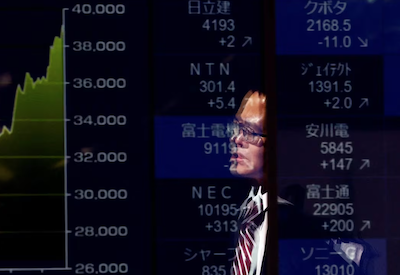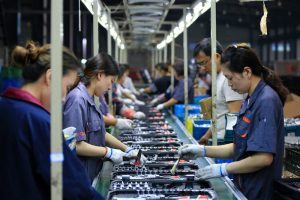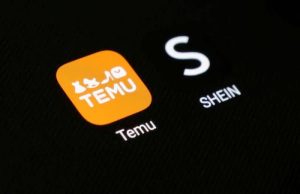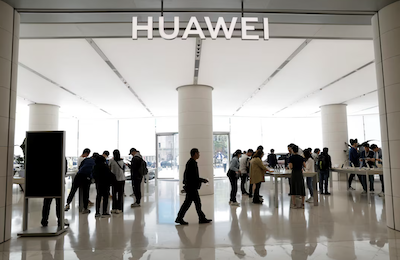Asia’s major stock indexes suffered a bruising end to the week as the situation in the Middle East escalated again after Israel’s missile attack on Iran.
Shares and bond yields sank while safe-haven currencies, gold and crude oil jumped amid increased concerns of a wider conflict that could spread to neighbouring states.
Japan’s Nikkei share average posted its worst day in more than two and half years as chip-related stocks also tracked losses in Taiwanese chipmaker TSMC.
Also on AF: US ‘Pressured’ Mexico to Reel Back China EV-Maker Incentives
The Nikkei fell 2.66% to close at 37,068.35 in its sharpest daily fall since September 2022, with 206 out of 225 stocks declining. For the week, it lost 6.2% in its biggest fall since June 2022. The broader Topix was down 1.91%, or 51.13 points, to 2,626.32.
Taipei-listed shares of TSMC fell nearly 7% following the company’s first-quarter earnings report in which it dialled back its expectations for chip sector growth and did not revise up its capital spending plans.
Chip-making equipment maker Tokyo Electron tanked 8.74% and was the biggest drag on the Nikkei. Chip-testing equipment maker Advantest lost 4.38%.
Mainland China and Hong Kong stocks fell, tracking their regional peers, pressured by the Israeli attack on Iran.
Israeli Prime Minister Benjamin Netanyahu had vowed retaliation earlier this week after Iran launched hundreds of drones and missiles in an unprecedented direct attack on Israel on April 13.
That attack was in response to a suspected Israeli strike on April 1 on an Iranian embassy compound in Syria that killed senior Iranian military commanders.
China’s blue-chip CSI300 index was down 0.79% with, earlier in the session, its financial sector sub-index lower by 0.36%, the consumer staples sector down 1.32%, the real estate index down 1.4% and the healthcare sub-index down 1.23%.
The Shanghai Composite Index fell 0.29%, or 8.96 points, to 3,065.26, while the Shenzhen Composite Index on China’s second exchange retreated 0.73%, or 12.36 points, to 1,686.56.
US Treasury Yields Slip
Chinese H-shares – stocks of companies from the Chinese mainland that are listed on the Hong Kong Stock Exchange or other foreign exchanges – fell 1.19% to 5,734.72, while the Hang Seng Index was down 0.99%, or 161.73 points, to 16,224.14.
Elsewhere across the region, Indian stocks advanced with Mumbai’s signature Nifty 50 index up 0.69%, or 151.15 points, to close at 22,147.00.
MSCI’s broadest index of Asia-Pacific shares dropped 2%, after earlier diving as much as 2.6%, and US stock futures pointed 1% lower, retracing part of an initial 1.7% slide.
US long-term Treasury yields were last down 9 basis points (bps) at 4.5567%, after earlier dropping as much as 15 bps. The safe-haven yen had rallied as much as 0.7% against the dollar but was last up about 0.3%.
Gold added 0.6%, but was earlier up as much as 1.7% at $2,417.59, taking it just shy of last week’s all-time high at $2,431.29.
Brent futures surged as much as 4.2%% on concerns Middle East supply could be disrupted, but were last up 2.4% at $89.22. Iran is the third-largest oil producer of the Organization of the Petroleum Exporting Countries, according to Reuters data.
Bitcoin dropped as much as 6.2% to a 1-1/2-month low of $59,590.74, before last trading about 2.7% lower at $61,842.
Key figures
Tokyo – Nikkei 225 < DOWN 2.66% at 37,068.35 (close)
Hong Kong – Hang Seng Index < DOWN 0.99% at 16,224.14 (close)
Shanghai – Composite < DOWN 0.29% at 3,065.26 (close)
London – FTSE 100 < DOWN 0.66% at 7,824.95 (0938 BST)
New York – Dow > UP 0.06% at 37,775.38 (Thursday close)
- Reuters with additional editing by Sean O’Meara
Read more:
China’s Weak Consumer Spending is Holding World Back: IMF Chief
TSMC Posts 9% Profit Rise Amid ‘Insatiable’ AI Chip Demand
Japan, Korea, US Agree Forex Cooperation As Yen, Won Dive
Hang Seng, Nikkei Rally on Tech Boost, Fed Rate Bets
























